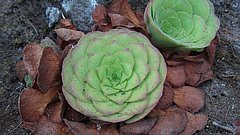30.03.2016 | sDiv, Research
Sea level changes since the last ice age impacts plant diversity

The isolation of oceanic islands promotes the development of unique species, like here Aeonium glandulosum from the Madeira Island. Photo: Juliano Sarmento Cabral, iDiv
Note for the media: Use of the pictures provided by iDiv is permitted for reports related to this media release only, and under the condition that credit is given to the picture originator.
Read more about the new paper in the press release of the University of Göttingen in German at http://www.uni-goettingen.de/de/3240.html?cid=5456 & https://idw-online.de/en/news648536
Publication:
Patrick Weigelt et al. (2016): Late Quaternary climate change shapes island biodiversity. Nature. http://dx.doi.org/10.1038/nature17443
News & Views:
José María Fernández-Palacios (2016): Island biogeography: Shaped by sea-level shifts. Nature. http://dx.doi.org/10.1038/nature17880
